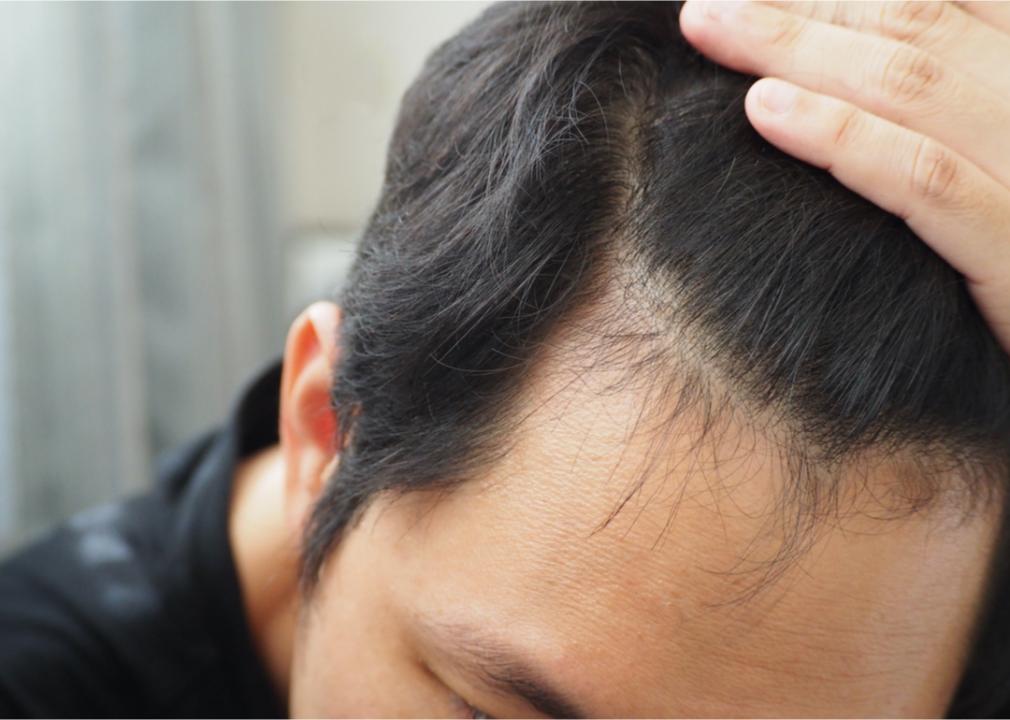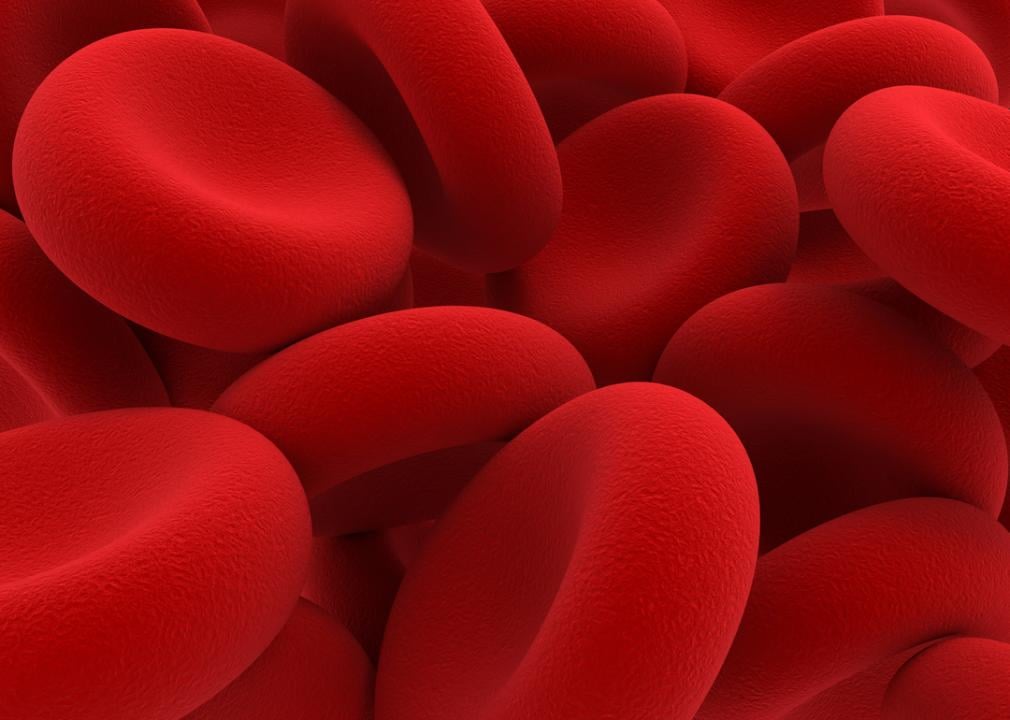10 effects testosterone has on your health

Canva
10 effects testosterone has on your health
Historically, testosterone has been associated with masculinity. Someone having high levels of testosterone was shorthand for perceived higher levels of aggression, strength, and libido. However, testosterone plays a significant role in the health and functioning of everyone: Testosterone plays just as important a part in ovarian function as it does in male reproductive development.
Having abnormally high levels of testosterone is not particularly common, and most typically occurs in athletes who have taken steroids or hormones to boost their athleticism. Low levels of testosterone, however, is a natural side effect of aging, with approximate percentages of males with low testosterone increasing from 20% to 50% from the age of 60 to 80. Additionally, injuries, radiation-focused medical treatments, and changes to the pituitary gland can all cause testosterone levels to drop.
Transmasculine nonbinary people and transgender men may use testosterone to help masculinize their bodies. In addition to the other effects testosterone has on the body, trans individuals who supplement the hormone have a decreased risk of gender dysphoria, depression, and anxiety as the hormone replacement therapy (HRT) helps them feel more like themselves. Taking testosterone consistently will lead to facial and body hair growth, lowered vocal pitch, increased muscle to fat ratio, diminished or an end to menstruation, and other health conditions cisgender men experience.
Overall, testosterone levels vary widely from year to year, and even from hour to hour. This can affect a broad range of internal and external body functions. Testosterone manipulates everything from metabolism and weight, hair and skin quality, and concentration and mood. Over time, testosterone abnormalities can have serious effects on one’s bones and heart.
REX MD compiled a list of 10 effects that testosterone has on your health, using research from scientific journals and health news publications. Read on to find out the detriments—and occasional benefits—of having too much or too little testosterone flowing through your body.
![]()

Lebedev Roman Olegovich // Shutterstock
Your likeliness to build muscle
Testosterone can significantly affect the body’s ability to gain or lose muscle due to the particular biological reaction it causes. Once testosterone is emitted throughout the body, it naturally binds to muscle cells, which triggers those cells to increase protein production. It also spreads more neurotransmitters throughout the body, which stimulate tissue growth and growth hormones. This results in increased muscle mass. Consequently, low testosterone is associated with muscle loss, while high testosterone generally causes the opposite.

Jacob L // Shutterstock
Behaviors, from competition to aggression
Variations of energy, mood, and confidence are all affected by testosterone levels. Although testosterone levels can cause a certain behavior, those levels can also increase after doing certain activities: For instance, participating in sexual or competitive activities can lower or raise testosterone levels. High testosterone levels may result in abnormally high levels of aggression, irritability, and mood swings, as well as impaired decision-making abilities. Inversely, low testosterone can cause low confidence, listlessness, a lack of concentration, low energy, and depression. This is especially the case for transmasculine people and transgender men who can also experience gender dysphoria on top of the other symptoms associated with lower testosterone levels.
Notably, it is difficult to separate these behavioral phenomena from the multiple biological and environmental influences simultaneously at play, and so one should be cautious in attributing a behavioral change exclusively to testosterone levels.

wutzkohphoto // Shutterstock
Bone density
Testosterone’s effects on bone density are due to its interactions with bone marrow, during which it can spur the marrow to produce red blood cells at higher rates. Low testosterone levels can weaken bone density, causing bones to be brittle and weak. This puts those with testosterone deficiencies at higher risks of fractures and breaks. Consequently, bone strength can sometimes be increased through raising testosterone. For instance, someone suffering from osteoporosis may take testosterone replacements alongside other treatments.

Galina_Lya // Shutterstock
Libido
Testosterone’s relationship to libido is a two-way street: while testosterone can affect sexual performance, sexual activity can also affect testosterone levels. Low testosterone is associated with low libido and erectile dysfunction—however, extended periods of sexual inactivity can also cause lowered testosterone. Higher levels of testosterone can increase libido, though (somewhat counterintuitively) also lower sperm counts. Changes in libido are not exclusive to men: women with testosterone deficiency can also suffer from low sexual desire. The effects of testosterone on libido levels in women becomes unclear once women have undergone menopause. About 70% of trans men reported an increase in sexual desire after beginning to supplement testosterone, while about 30% rarely or never felt sexual desire.

topperspix // Shutterstock
Hair growth
Testosterone initially affects hair growth via its role in the onset of reproductive development, causing hair to sprout on the face, underarms, and genitals of puberty-age males. In transmaculine people and transgender men on testosterone, the distribution of hair growth shifts, leading to increased facial and body hair growth and increased risk of male-patterned baldness. Transfeminine people and transgender women on HRT, conversely, experience less facial and body hair growth and density due to increased estrogen levels, in addition to blocking the production of testosterone. Later in life, these effects continue to be noticeable. As men approach old age and their testosterone levels naturally fall, they may experience hair loss on both the head and body. Women who experience abnormally high testosterone levels may notice hair growing on their faces. This is particularly true of women with polycystic ovary syndrome (PCOS), which results in spiked testosterone levels.

Jacob L // Shutterstock
How you burn fat
Metabolism can be sped up or slowed due to testosterone levels. Testosterone regulates metabolism, and a healthy testosterone balance allows the body to avoid burning too much or too little fat. Those with high testosterone levels may notice weight gain, and trans individuals on HRT typically gain weight as well. This is due to a variety of factors that may not actually indicate an accumulation of fat, including fluid retention and increased muscle mass. Because testosterone increases muscle mass, however, it may result in fat loss, as muscles increase one’s metabolic rate both at rest and during exercise.

RomanenkoAlexey // Shutterstock
Red blood cell production
Generally, higher levels of testosterone causes more red blood cells to be produced. During a 2014 study, 60 60-year-old men received either testosterone treatments or placebos, with their resulting iron metabolism and red blood cell levels compared. Results indicated that increased testosterone levels spurred the production of red blood cells, with hemoglobin levels in treatment recipients increasing by 8%. Consequently, testosterone replacement therapy may have benefits for the heart, cholesterol, and blood pressure, though these effects are still being confirmed. Results of HRT’s impact on transgender individuals’ cardiovascular health—either blocking or increasing the production of testosterone—is also inconclusive.

Maridav // Shutterstock
Skin conditions
Testosterone can cause skin to be quite reactive, depending on the level. Those with high levels of testosterone may experience acne breakouts. In some cases, testosterone-deficient individuals may receive replacements via patches or creams, in which case testosterone’s direct application may result in irritated skin. Cisgender women with abnormally high levels of testosterone may develop dark patches of skin. In these cases, hormone-blocking diuretics may be able to mitigate symptoms. Transmasculine people and trans men also face these health risks when on HRT, and transfeminine people and trans women may also need to change up their skincare routines when on HRT.

Kzenon // Shutterstock
Reproductive system growth and development
Testosterone is directly linked to reproductive development in cisgender men. Testosterone levels begin to affect an embryo while it is still in-uterus, triggering the initial formation of male genitals. At the onset of puberty, levels of the hormone rise, causing the growth of the testicles and penis, and the production of sperm. Cisgender men with a testosterone deficiency around this age may not experience these developments. Despite testosterone’s connotation as an indicator of masculinization, it also plays an important role in female development. The right levels of estrogen and testosterone ensure that the ovaries function properly.
For trans individuals, taking puberty blockers before puberty can help them better understand their gender identity and if they would want to pursue HRT in the future. This will make transitioning easier later in life as they do not have to reverse the effects the body goes through during adolescence, namely to their reproductive systems. If a person decides to go through with HRT at any stage in life, decreasing testosterone will result in lower sperm count for transfeminine people and trans women; however, HRT does not block sperm count entirely, meaning trans people increasing estrogen can still be fertile. For transmaculine people and trans men, testosterone can end menstruation and similarly decrease fertility. Although, a recent study found trans masculine people and trans men can stop supplementing testosterone for four months and see similar egg yields to cisgender women. For the sake of fertility, it is recommended trans people either freeze their sperm or eggs to better guarantee the possibility of having their own children in the future.

Olena Yakobchuk // Shutterstock
Sleep patterns
Both irregularly high and low levels of testosterone can upset the quality and quantity of hours spent sleeping. Inversely, regular, uninterrupted sleep is required to maintain healthy levels of testosterone in the body. Those with irregular levels of testosterone may be more vulnerable to sleep-related disorders. During a 2003 study, 17 men over 60 years old were observed after receiving regular injections of testosterone. Among other effects, it was found that the hormone disrupted sleep, resulting in spells of sleep apnea, disturbed breathing patterns, and fewer hours slept overall.
This story originally appeared on REX MD
and was produced and distributed in partnership with Stacker Studio.
